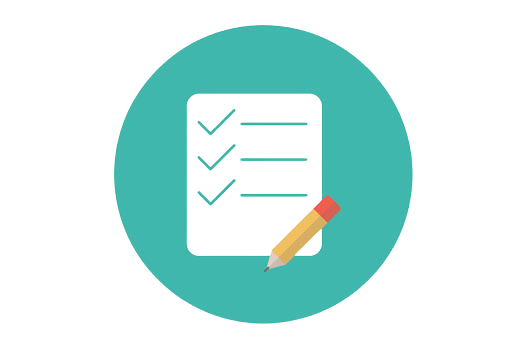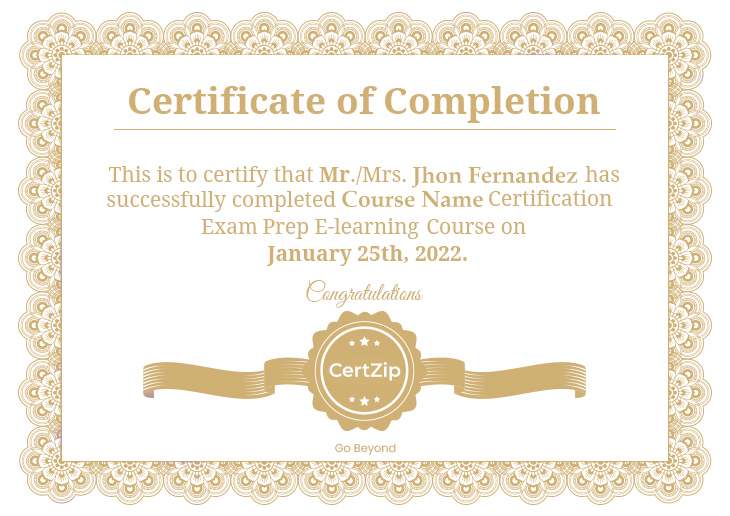Your Shopping Cart

The Microsoft Azure DevOps Certification (AZ-400) Course at CertZip has been designed by industry experts to meet the needs of the industry.
This course will teach you how to create and implement collaboration, security, source code management, compliance, delivery, continuous integration, and monitoring methods.
Microsoft's Azure DevOps platform, a Software as a Service (SaaS) platform, provides an end-to-end DevOps toolchain for software development and deployment. It may be used to coordinate a DevOps Toolchain and connects with many of the most common tools available. Azure DevOps provides a wide range of services that span the whole development lifecycle. At the time of writing, the following services were available: Azure Boards Azure Repos Azure Pipelines Azure Test Plans Azure Artifacts Azure DevOps is a well-known platform with mature functionality. Due to its flexibility in terms of supported platforms, languages, and cloud vendors, it is a feasible solution for many businesses. Upgrade to Azure DevOps if you're currently using Team Foundation Server on-premises.
The Azure DevOps Solutions Course teaches you how to implement DevOps processes. Learners will gain knowledge of source control, how to scale Git in an organization, how to consolidate artifacts, and how to handle secrets. They'll also learn how to set up continuous integration, construct a container build strategy, create a release strategy, set up a release management workflow, and use feedback mechanisms.
This Microsoft Azure DevOps course is for IT professionals interested in a career in Cloud Computing and DevOps. This AZ DevOps certification course will assist you in taking advantage of this opportunity and advancing your career. It's ideal for the following situations: Individuals seeking to establish their credibility and value as seasoned DevOps practitioners in the market. Those who want to clear Microsoft Certified: DevOps Engineer Expert Exam Software Developers Solution Architects System Administrators Cloud Professionals Project Manager Technical Leads Site Reliability Engineers
Cloud architecture fundamentals Cloud Computing Basics Concepts such as networking, virtualization, and databases need to be understood at a basic level. Expertise with the Visual Studio IDE, PowerShell, and the Command-Line Interface
The Microsoft Azure DevOps Certification Training Program prepares you for some of the most prominent roles at the world's leading organizations. Work on assignments that are relevant to the corporate world while learning about Azure and DevOps ideas. Industry experts created this top Azure DevOps course online. You'll be able to apply for top employment at top MNCs all over the world with top wages after completing the Azure certification for DevOps. All videos and course materials from CertZip are available for a lifetime. For no additional cost, you may also upgrade your course materials to the most recent edition. As a result, it's a one-time purchase.
At CertZip, you'll never miss a class. You have two choices: In your LMS, you can see a recording of the class session. You can join any live batch to make up for the missed session.
Some of the major reasons to opt for CertZip’s Microsoft Azure DevOps course includes: According to MarketsandMarkets, at a CAGR (Compound Annual Growth Rate) of 24.7%, the DevOps market is expected to grow from USD 3.42 Billion in 2018 to USD 10.31 Billion by 2023. As per Glassdoor.com, on average the salary offered to Site Reliability Engineer is $118k per annum whereas for DevOps Engineer $99k. Canalys has estimated that 19% of the total cloud infrastructure market worldwide is held by Azure. These figures show the rapid expansion of the Microsoft Azure DevOps market, hence the course will take you one step closer to your dream.
Learning Objective: In this Azure 400 Certification module, you will understand the important aspects of Azure as well as DevOps. Also, learn about the role of planning and source code management in DevOps. Topics: Introduction to Azure Introduction to DevOps Introduction to Azure DevOps Introduction to Transformation Planning Introduction to Source Control Migrating to Azure DevOps Git Authentication in Azure Repos Hands-On: Creating an Azure account Azure Boards - Agile Planning and Portfolio Management Git Version Controlling Git Version Control through Visual Studio Code Editor Code Review with Pull Requests
Learning Objective: Create and implement a Build Strategy for your Azure Pipeline to implement continuous integration. Topics: DevOps Pipeline Azure Pipeline Hosted and Private Agents Pipeline and Concurrency Azure Pipeline YAML and Visual Designer Continuous Integration Build Strategy Implementation Integrating Azure Pipelines Setting up Private Agents Analyze and Integrate Docker Multi-Stage Builds Hands-On: Implement Continuous Integration with Azure Pipelines Integrate External Source Control with Azure Pipelines
Learning Objective: Create and deploy a multi-container application on an AKS Cluster. Also, utilize Azure Container and container registry services. Topics: Introduction to Container Introduction to Orchestration Introduction to Kubernetes Azure Kubernetes Service (AKS) Hands-On: Deploy a multi-container application to AKS Modernizing ASP.NET Application to Azure
Learning Objective: Manage artifact versioning and use WhiteSource to manage secure open-source softwares and licenses. Topics: Package dependencies Package management Migrating and consolidating artifacts Package security Open-source software License and vulnerability scan integration Hands-On: Updating Packages
Learning Objective: Configure a CI/CD pipeline using YAML and manage your secrets using Azure Vault. Also, configure Azure Monitor as a part of the Release Deployment and create a release dashboard to collect and share information. Topics: Continuous Delivery Azure Release Pipeline Deployment Patterns Release Tools Tasks and Templates Integrating Secrets with Release Pipeline Automating Health Inspection Hands-On: Configuring CI/CD Pipeline as Code with YAML Using secrets in the pipeline with Azure Key vault Setting up and Running Functional Tests Release deployment control using Azure Monitor as release gate Create a release Dashboard to share information, monitor progress, and trends
Learning Objective: Configure IaaS and PaaS services on Azure. Also, deploy a containerized docker application on Azure Web Apps using the Container registry. Topics: Deployment Modules and Deployment Options Azure IaaS and PaaS Services Serverless and HPC Computer Services Azure Service Fabric Deployment Patterns Hands-On: Feature Flag Management using LaunchDarkly Deploying a Dockerized app to Azure Web App for Containers
Learning Objective: In this Microsoft DevOps certification module, you will learn to deploy and configure Azure DevOps dashboards and utilize Application Insights to monitor application performance. Also, learn how to integrate Azure DevOps with Teams. Topics: Tools to Track System Usage, Feature Usage, and Flow Azure Dashboard Ticketing Systems Practices for Measuring End-User Satisfaction Processes for Capturing and Analyzing user Feedback Process for Automating Application Analytics Site Reliability Engineering Baseline by Analyzing Telemetry Tuning to Reduce Meaningless or Non-Actionable Alerts Hands-On: Monitoring Application Performance Integration between Azure DevOps and Teams
Learning Objective: In this Azure AZ 400 certification module, you will learn to create a Terraform Project using the Microsoft Demo generator to automate the infrastructure. Also, utilize ARM templates to demonstrate Infrastructure as Code (IaC). Topics: Infrastructure as Code and Configuration Management Azure Resources Desired State Configuration (DSC) Automation with DevOps Chef Puppet Ansible Terraform Jenkins Hands-On: Automate Infrastructure Deployment in the Cloud with Terraform and Azure Pipelines Azure Deployments using Resource Manager Templates
Learning Objective: In this Azure DevOps expert certification module , you will learn about the Microsoft Certified: DevOps Engineer Expert Exam. Also, gain in-depth knowledge on how Azure DevOps has helped real-world organizations optimize development and deliver faster through various case studies.
A certification that validates your cloud skills, as well as Agile or DevOps methods of working, can improve your chances of being employed and receiving a fair wage. According to Nigelfrank, a Microsoft recruitment firm, a junior Azure DevOps Engineer earns an average of $125,000, while senior and mid-level engineers earn $185,000 and $145,000 respectively. If you want to work in this industry, now is the time to earn your Azure DevOps engineer certification.
The role of an Azure certified DevOps engineer includes designing and implementing a plan to collaborate, infrastructure, code, and security. Their role also includes responsibilities for compliance, testing, and continuous integration. Monitoring and feedback are also a responsibility included.
Yes, once you have enrolled in the course, you will receive lifetime access to the course material.
Over 70% of Edtia Learners have seen a change in job profile (promotion), lateral transfers, work location (onsite), or new job opportunities. The Edtia AZ 400 certification is well-known in the IT business since it is a testament to the extensive and practical training you've received as well as the real-world projects you've completed.
How do I get my Edtia Microsoft Azure DevOps Certification (AZ-400) certificate?


Every certification training session is followed by a quiz to assess your course learning.

The Mock Tests Are Arranged To Help You Prepare For The Certification Examination.

A lifetime access to LMS is provided where presentations, quizzes, installation guides & class recordings are available.

A 24x7 online support team is available to resolve all your technical queries, through a ticket-based tracking system.

For our learners, we have a community forum that further facilitates learning through peer interaction and knowledge sharing.

Successfully complete your final course project and CertZip will provide you with a completion certification.
The exam will show that you can develop a DevOps strategy, implement development processes, dependency management, and bypass continuous integration/delivery (CI/CD). This certification will show your knowledge of DevOps and your ability to use Agile tools and services, such as third-party tools that Microsoft Azure supports.
Passing exam AZ-400: Developing and Executing Microsoft DevOps Solutions validates the skills and knowledge to combine people, processes, and technologies to deliver valuable products and services that meet end-user needs and business objectives.
